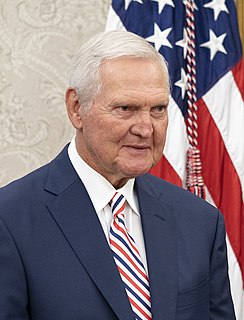A Quote by Judd Gregg
Derivatives are a huge, complex issue.
Quote Topics
Related Quotes
The issue is not about raising taxes. The issue is, how do we allocate the wealth that we have? We spend trillions of dollars on a military industrial complex. The United States accounts for 38% of all the military armaments produced in the world. 38%. This is a huge amount of money. People want and need services. They want roads, they want healthcare.
From the 1990s onward, the financial sector created a vast array of instruments designed to separate investors from their money, financial derivatives of an ever-increasing level of complexity. At some point, this complexity reached a point where even the creators of the derivatives themselves didn't understand them.
We divorced ourselves from the materials of the earth, the rock, the wood, the iron ore; we looked to new materials which were cooked in vats, long complex derivatives of urine which we called plastic. They had no odor of the living, ... their touch was alien to nature. ... [They proliferated] like the matastases of cancer cells.


































